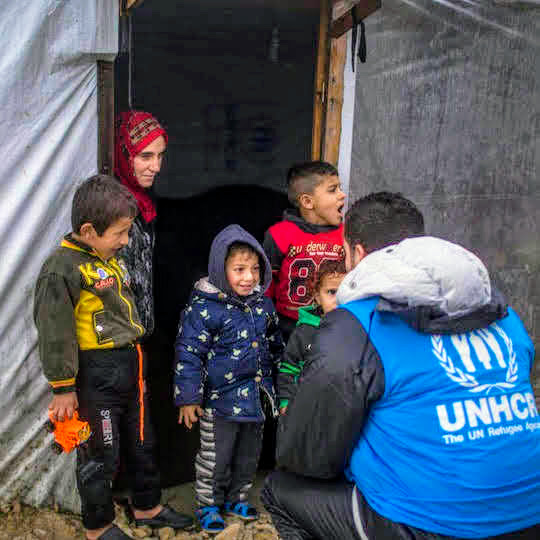Vulnerability Assessment of Refugees of Other Nationalities - 2020
Lebanon, 2020
Get MicrodataIdentification
UNHCR_LBN_2020_VARON_v2.1
Vulnerability Assessment of Refugees of Other Nationalities - 2020
| Name | Country code |
|---|---|
| Lebanon | LBN |
Since 2016, the Vulnerability Assessment of Refugees of Other Nationalities (VARON) has been a key tool for advocacy and program design. The survey aims to represent non-Syrian refugee households.
For over five decades, refugees from the Middle East and Africa have sought protection in Lebanon. These include refugees from Iraq, Sudan, Ethiopia, Egypt, Yemen and other countries, many of which have been in Lebanon prior to the Syrian crisis. The compounded crisis in Lebanon, including economic deterioration and rising inflation, COVID-19 outbreak and the Beirut port blast has impacted all persons living in Lebanon, including refugees of all nationalities.
The key objectives of the VARON include:
• Providing a multi-sectoral update of the situation of refugees from Iraq and other countries in Lebanon through an annual household survey. The survey covers key indicators related to multiple sectors including protection, shelter, water and hygiene, health, livelihoods, socio-economic vulnerability, food security and more
• Enhancing the targeting for the provision of multipurpose cash assistance. The data gathered through the VARON, particularly on expenditure, is used to build econometric models, which are used to determine eligibility for multi-purpose cash and food assistance
Sample survey data [ssd]
Household and individual.
Version
v2.1: Edited, cleaned and anonymised data.
Scope
The scope includes:
- key indicators on household demographics
- safety and security
- accomodation
- health
- food security
- livelihoods
- expenditures
- food consumption
- debt
- coping strategies and assistance
- intention to return
- education
- legal documentation
| Topic |
|---|
| Health and Nutrition |
| Health |
| Education |
| Livelihood & Social cohesion |
| Food security |
| Water Sanitation Hygiene |
| Community Services |
Coverage
National coverage
Non-Syrian refugee households
Producers and sponsors
| Name |
|---|
| UNHCR |
| WFP |
Sampling
The assessment surveyed a total of 680 refugee households of Iraqi and other nationalities registered with UNHCR Lebanon. A targeted sample was selected from the total number of households registered in UNHCR database. At the time of the study, there were around 6,600 registered refugee families from countries of origin other than Syria. Sampling occurred through simple random sampling, separately for Iraqi refugees and refugees of other nationalities, to ensure representative results for each population group. The distribution of this refugee population is concentrated in 2 of the eight governorates in Lebanon, with over 80 percent of the population residing in Beirut or Mount Lebanon. As such, no geographical stratification was applied to the sample methodology.
Weights were assigned to each nationality group (Iraqi and non Iraqi) according to the population of refugees registered in the country. The weighting system was used to compensate for the unequal probabilities of a household/individual being included in the sample.
Survey instrument
The questionnaire included key information on household demographics, arrival profile, registration, protection, shelter, WASH, assets, health, security, livelihoods, expenditures, food consumption, coping strategies, debts and assistance, as well as infant and young feeding practices. The questionnaire is a household survey administered typically with the head of household or another adult household member. The interview took around 1 hour per household to complete.
Data collection
| Start | End |
|---|---|
| 2020-08-19 | 2020-09-17 |
| Name |
|---|
| Makhzoumi foundation |
| Caritas |
| Social, Humanitarian, Economical Intervention for Local Development |
| World Vision International |
Data was collected between 19 August and 17 September 2020, through face-to-face interviews conducted at refugee homes. Enumerators employed by UNHCR partners were trained on the data collection tool, contextual background, methodology and ethical considerations and participated in a two-day field testing. Additionally, they were required to attend a two-hour online COVID-19 training provided by the Lebanese Red Cross, which covered key information about the virus, transmission and precautionary methods to adhere to during data collection. Data was collected and entered on electronic tablets by the enumerators during the interviews, using KoBo toolbox software.
Data Access
UNHCR, WFP (2020). Vulnerability Assessment of Non Syrian Refugees in Lebanon. Accessed from: https://microdata.unhcr.org
Contacts
| Name | Affiliation | |
|---|---|---|
| Curation team | UNHCR | microdata@unhcr.org |
Metadata production
UNHCR_LBN_2020_VARON_DDI_v1.0
2021-08-10
